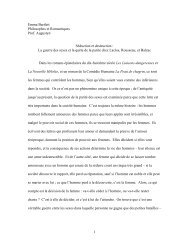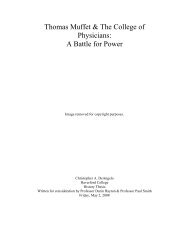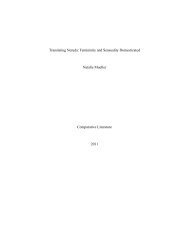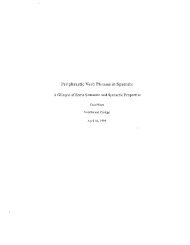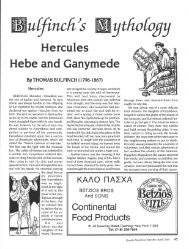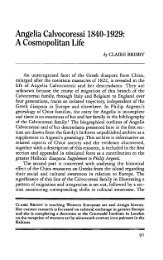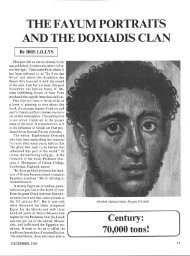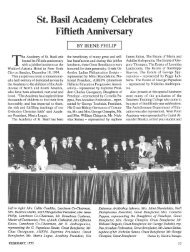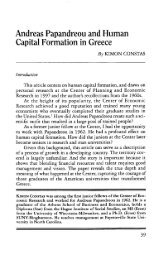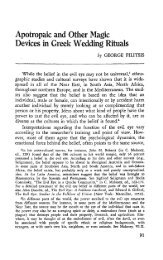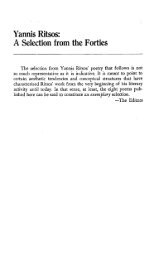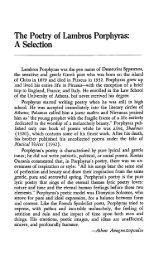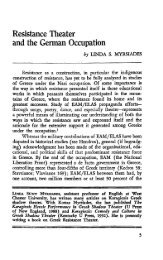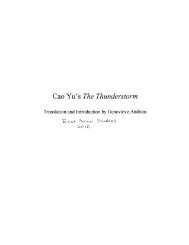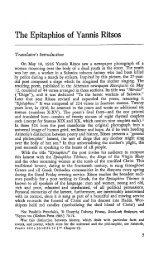Mythistorema - Triceratops Home
Mythistorema - Triceratops Home
Mythistorema - Triceratops Home
Create successful ePaper yourself
Turn your PDF publications into a flip-book with our unique Google optimized e-Paper software.
36 JOURNAL OF THE HELLENIC DIASPORA<br />
involvement of Ares and the wounding of Adonis, symbolized by the<br />
tearing of the ground by the plow, are inextricable parts of the life cycle.<br />
In Greek mythology, Cygnus (Swan) was the son of Mars and Pelopeia;<br />
he was the king of Amphanae, who used to catch passing strangers and<br />
force them into a duel that he always won until he was finally killed by<br />
Hercules. Seferis writes in his Journals that he uses the swan as a cruel<br />
and very vindictive bird? He uses the motif of the swan repeatedly to<br />
associate beauty and love with destructiveness. Only in very few places<br />
is the swan imagery used with exclusively positive overtones, as for example<br />
in poem "7": "calmer than swan's down." In most other cases<br />
where the swan motif appears, there is an unpleasant or destructive implication,<br />
as for instance in "Helen," in the Three Secret Poems (section<br />
6 of "On Stage") and most notably in the "Decision to Forget.""<br />
The line "In the winter nights the strong wind from the east maddened<br />
us" can be interpreted only in relation to the cycle of life, the<br />
"immemorial drama" mentioned in the beginning of the poem. Traditionally<br />
the wind is considered a symbol of poetic inspiration, but also, along<br />
with the sun, it can be a "fructifier and creator."" Thus, the line very<br />
probably has erotic symbolic overtones. C.G. Jung, discussing in his<br />
Symbols of Transformation the American Indian legend as it appears in<br />
Longfellow's poem "The Song of Hiawatha," refers to the West Wind<br />
as "the fertilizing breath," the father of all winds, and mentions in<br />
particular the "wooing" and the "caressing courtship" of the East Wind."<br />
The motif of the wind is encountered in two other poems of <strong>Mythistorema</strong>,<br />
"7" ("South Wind") and "19," in both of which it has erotic<br />
connotations. In all three poems the effect of the wind is tyrannical:<br />
And once again this wind<br />
Stropping its razor's edge upon our nerves.<br />
("South Wind")<br />
Even if the wind blows it brings us no refreshment.<br />
("19")<br />
degrees did the activities of the god become specially connected with the domain<br />
of war" (91).<br />
"Journal C, 180.<br />
YBIn the "Decision to Forget" Seferis presents the hunter-victim situation using<br />
swans as symbols of destructiveness and the village girls as innocent victims. On<br />
another level, these cruel birds, the descendants of Ares (Mars), represent the<br />
Aryan invaders slaughtering people and ravaging Europe. See Nora Anagnostaki's<br />
essay "10 Iscpinc tilc MALI.% xal t5 friap.ovtffg" ("Seferis of Memory and<br />
Forgetfulness"), in rtat 'thy Istpipn [For Seferis), eds. Leonidas Zenakos and<br />
George Savidis (Athens: n.p., 1961) 240.<br />
"C.G. Jung, Symbols of Transformation, tr. R.F.C. Hull, 2d ed. (Princeton,<br />
N.J.: Princeton University Press, 1967) 100.<br />
"Jung, 316-7,



